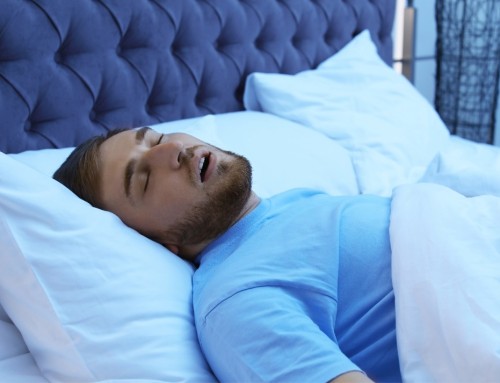Obstructive sleep apnea (OSA) is more than a sleep disorder—it’s a condition that can impact your overall health, increasing your risk for heart disease, high blood pressure, and cognitive issues. What many patients don’t realize is that preventive dentistry plays a key role in identifying and managing sleep apnea before these complications develop.
At our Houston, TX dental office, we take a proactive approach to airway health. Through comprehensive exams, we look for early signs of airway restriction, teeth grinding, or jaw misalignment that may contribute to sleep apnea. When detected early, customized oral appliance therapy can help prevent the condition from worsening and reduce dependence on CPAP therapy.
Our goal is to help you breathe, sleep, and live better—using dentistry not just to treat, but to prevent future sleep and health issues.
Understanding the Risks of Untreated Sleep Apnea
Sleep apnea doesn’t just cause snoring or restlessness—it disrupts oxygen flow and places stress on the entire body. When breathing pauses throughout the night, your brain repeatedly wakes you, preventing deep, restorative sleep.
Because your oral structures play a major role in maintaining an open airway, sleep apnea care often begins with a focus on oral health. Subtle changes in the jaw, tongue position, or bite alignment can contribute to airway obstruction, and addressing these concerns early can make treatment more effective and even prevent progression.
Untreated OSA increases your risk of:
- High blood pressure and heart disease
- Stroke and diabetes
- Chronic fatigue and impaired concentration
- Depression and mood swings
Choosing a sleep apnea treatment method that works for your lifestyle can protect your long-term health and restore energy, focus, and restful sleep.
How CPAP Therapy Works
CPAP stands for Continuous Positive Airway Pressure. This treatment involves wearing a mask connected to a machine that delivers a constant air flow, keeping your airway open while you sleep.
The CPAP system includes:
- A facial or nasal mask
- A hose connecting the mask to a bedside machine
- Adjustable pressure settings based on your sleep study results
CPAP is considered the gold standard for moderate to severe OSA because it provides consistent airway support. However, despite its effectiveness, many patients find it challenging to use it nightly.
Common CPAP Challenges
For many individuals, the bulky equipment and noise associated with CPAP can interfere with sleep instead of improving it. Some of the most common issues reported by CPAP users include:
- Claustrophobia or discomfort from the mask
- Dry nose or mouth
- Air leakage or pressure-related soreness
- Noise disturbance (from the machine or airflow)
- Difficulty traveling with equipment
Because of these challenges, CPAP compliance rates are lower than expected—many patients eventually stop using the device regularly, which puts their health at continued risk.
What Is Oral Appliance Therapy?
Oral appliance therapy (OAT) is a practical, non-invasive alternative to CPAP offered by a Houston dentist in Spring, TX for patients with mild to moderate obstructive sleep apnea. This treatment involves wearing a custom-fit mouthpiece at night that gently shifts your lower jaw forward to keep your airway open.
At Stephens & Gatewood Dentistry, we design these appliances in-house using digital scans to ensure a perfect fit. Each device is small, comfortable, and easy to use—and many patients find they are far more manageable than a CPAP machine.
Comparing Comfort and Convenience
When choosing between CPAP and oral appliance therapy, comfort often plays a deciding role. While both treatments aim to prevent airway collapse, they differ in how they fit into your nightly routine.
CPAP Side Effects and Limitations
- Mask irritation, facial marks, and pressure sores
- Dry or stuffy nose from air pressure
- Difficulty sleeping with tubes and straps
- Incompatibility with certain sleep positions (especially stomach or side sleepers)
- Inconvenience during travel due to machine size and need for power source
Oral Appliance Advantage
- Compact, portable design
- No noise, tubes, or wires
- Easier to clean and maintain
- Greater comfort and freedom of movement
- Better adherence for long-term use
Although oral appliances can initially cause minor jaw or tooth discomfort, most users adapt quickly. In rare cases, long-term use may slightly shift tooth alignment, but we monitor these changes with regular dental follow-ups.
Effectiveness and Compliance
Both CPAP and oral appliance therapy are effective—but only if used consistently. The best treatment is the one you’ll use every night.
Recent studies show that while CPAP delivers more airflow control, oral appliances are more likely to be used regularly. This means that for many patients, an oral appliance’s real-world effectiveness equals or exceeds that of CPAP.
At Stephens & Gatewood Dentistry, we often see patients who have tried CPAP unsuccessfully and are now thriving with a custom-fitted appliance. Oral appliance therapy offers a more practical path to consistent results for those with mild to moderate OSA.
Who’s the Best Candidate for Each Option?
While every patient is different, there are general guidelines to determine which treatment is most effective based on your diagnosis and lifestyle.
CPAP Might Be Best For:
- Patients with severe OSA
- Those who have tried and failed with oral appliances
- Individuals needing higher, adjustable pressure for airway stability
Oral Appliance Therapy Might Be Best For:
- Patients with mild to moderate OSA
- Individuals who find CPAP uncomfortable or intolerable
- Frequent travelers or those with limited space at home
- Patients with TMJ or jaw pain (if the appliance is custom-designed with joint function in mind)
Our practice offers in-home sleep testing using WatchPAT technology to assess your apnea levels and determine candidacy for oral appliance therapy.
Tips for Successful Treatment Use
Building a consistent sleep routine and maintaining your equipment is key, regardless of your treatment. Here are some helpful strategies:
- If using CPAP, ensure your mask fits properly to avoid air leakage
- Use a heated humidifier to reduce nasal dryness
- For oral appliances, ease into wear time gradually and clean the device daily
- Keep follow-up appointments to monitor fit, jaw health, and sleep quality
- Report any discomfort or changes to your dentist or sleep physician
Remember, no treatment works overnight. Give your body time to adjust and seek support if you need it.
Comprehensive Dental Care for Better Sleep and Health
Our experienced team doesn’t just treat teeth—we help patients improve their sleep and overall health. At Stephens & Gatewood Dentistry, we offer:
- In-home sleep apnea testing
- Digital scanning and custom oral appliance fitting
- Collaborative care with sleep physicians
- Ongoing follow-up and appliance adjustment
- Consideration for TMJ health and bite alignment
- Two convenient Spring, TX locations: Cypresswood (281) 320-2000 and Auburn Lakes (832) 843-6619
We understand how life-changing better sleep can be. That’s why we’re committed to helping you find a comfortable, sustainable solution for your sleep apnea—whether that’s oral appliance therapy or CPAP.


